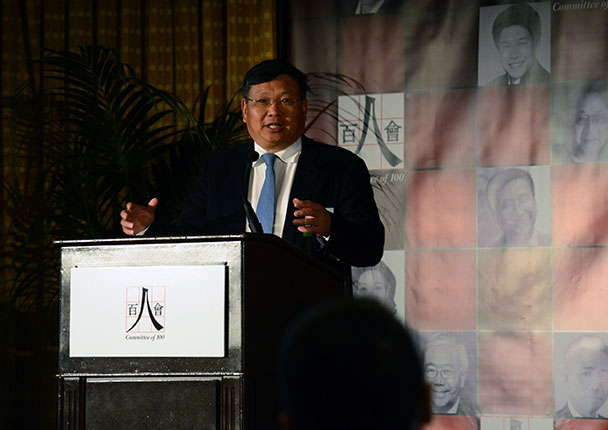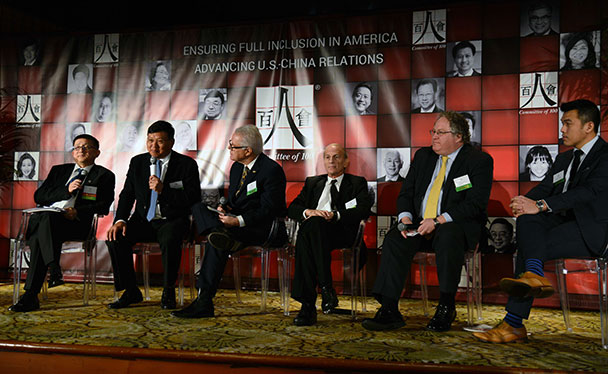CKGSB Founding Dean Xiang Bing told the Committee of 100 (C-100) 2016 Annual Conference in Los Angeles that China and the United States can usher in a new age of enlightenment by collaborating to meet global challenges tied to a wave of technological, social and political disruptions.

Founding Dean and Professor of China Business and Globalization at CKGSB, Xiang Bing, addresses the Committee of 100 (C-100) 2016 Annual Conference in Los Angeles
With a two-way flow of learning, insights and innovation, China and the US can bring a “renaissance” to the world, the Dean said.
“We’re at a time of major disruption,” Dean Xiang told the C-100 conference, a major parley on US-China relations and Chinese-American advancement. Amid common issues such as income and wealth inequality and climate change, “we need to be open-minded to new experiments to meet these challenges on every front,” he said.
“And in light of this, I continue to be optimistic about the future for China’s economic prospects and am immensely optimistic about China’s relations with the US.”
Major parley
The conference is a highlight of the year for the C-100, a membership organization of Chinese Americans dedicated to the spirit of excellence and achievement in America whose members include architect I.M. Pei, cellist Yo-Yo Ma and YouTube co-founder Steve Chen.
Topics discussed at the April 16 event included the US-China economic and political outlook, economic espionage and Hollywood and China.
Dean Xiang, who also is a CKGB Professor of China Business and Globalization, made his comments following welcoming remarks by Ed Royce, a Republican Californian congressman who chairs the US House Committee on Foreign Affairs.

CKGSB Dean Xiang Bing (second from left) shares his views on a panel discussion
at the Committee of 100 (C-100) 2016 Annual Conference in Los Angeles
The Dean also was a panelist for a discussion on the US-China economic and political outlook. Chairing that session was C-100 member Dr. Cheng Li, director of the John L. Thornton China Center at Brookings Institution, and a director of the National Committee on US-China Relations.
Panelists also included Dr. Jeffrey Bader, a senior fellow in the John L. Thornton China Center at Brookings; Dr. David M. Lampton, Director of SAIS-China and China Studies at the Johns Hopkins School of Advanced International Studies; Clayton Dube, Executive Director of the USC US-China Institute; and Stephen Cheung, President of the World Trade Center Los Angeles.
Increasing understanding
In his remarks, Dean Xiang sought to increase the audience’s understanding of how China’s economic landscape functions and the commonalities between the US and China.
He discussed the Chinese government’s influential role in economic matters, citing as an example the National Development and Reform Commission of the People’s Republic of China (NDRC) – an agency under the Chinese State Council that manages economic administration and planning. State Owned Enterprises in China are dominant in more than 20 sectors, he added.
Discussing similarities between China and the US, Dean Xiang said both nations practice neoliberalism – using policies that aim to enhance the private sector’s economic role. In China, the private sector contributes about 70 percent of the nation’s GDP, 80 percent of jobs and more than 90 percent of new jobs, the Dean said.
The two nations also share trends of globalization and the use of social media, he said.